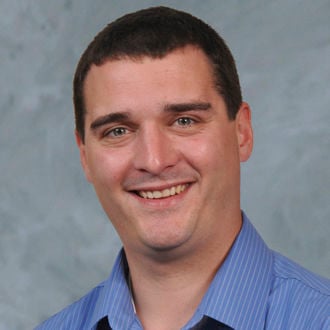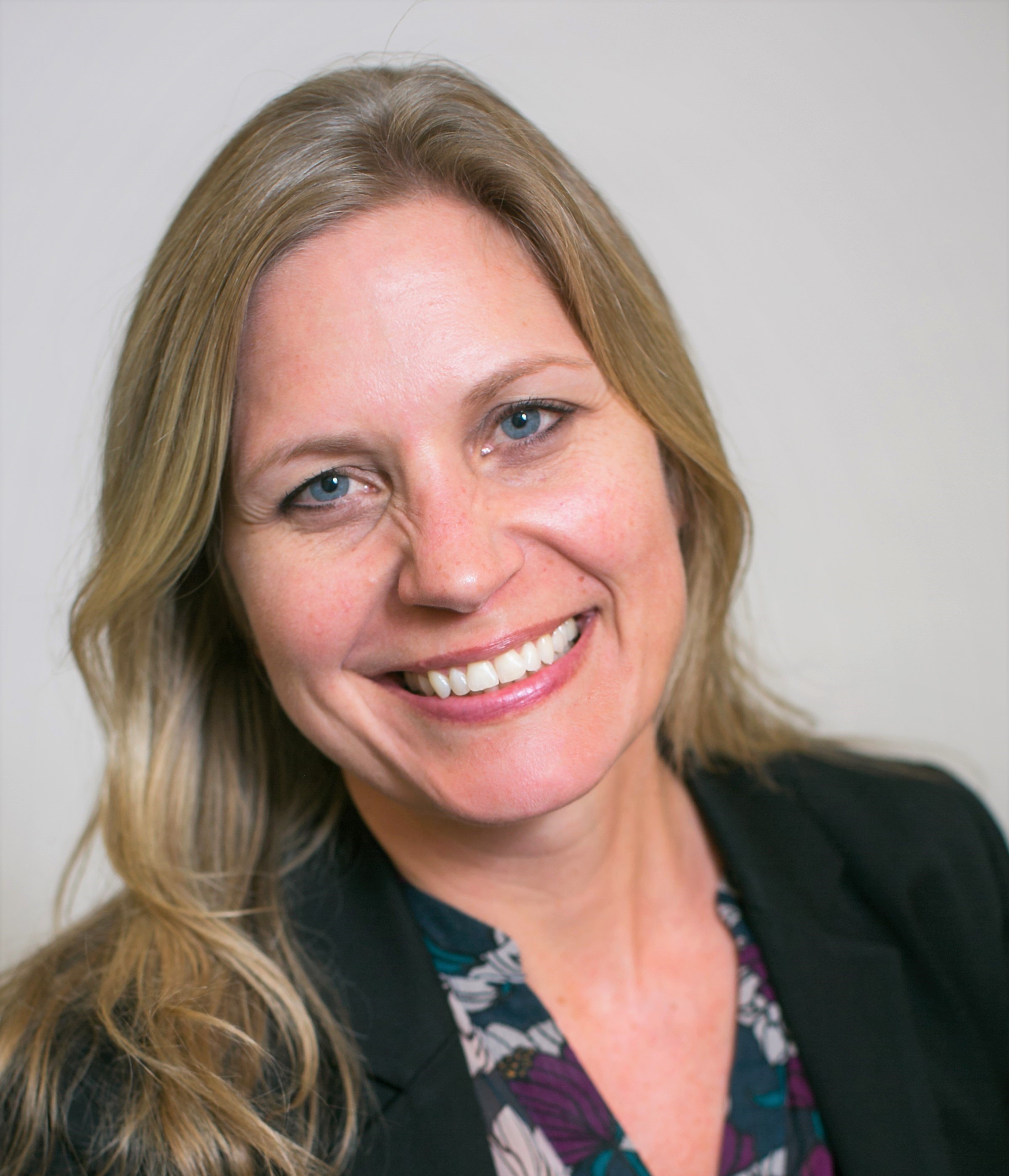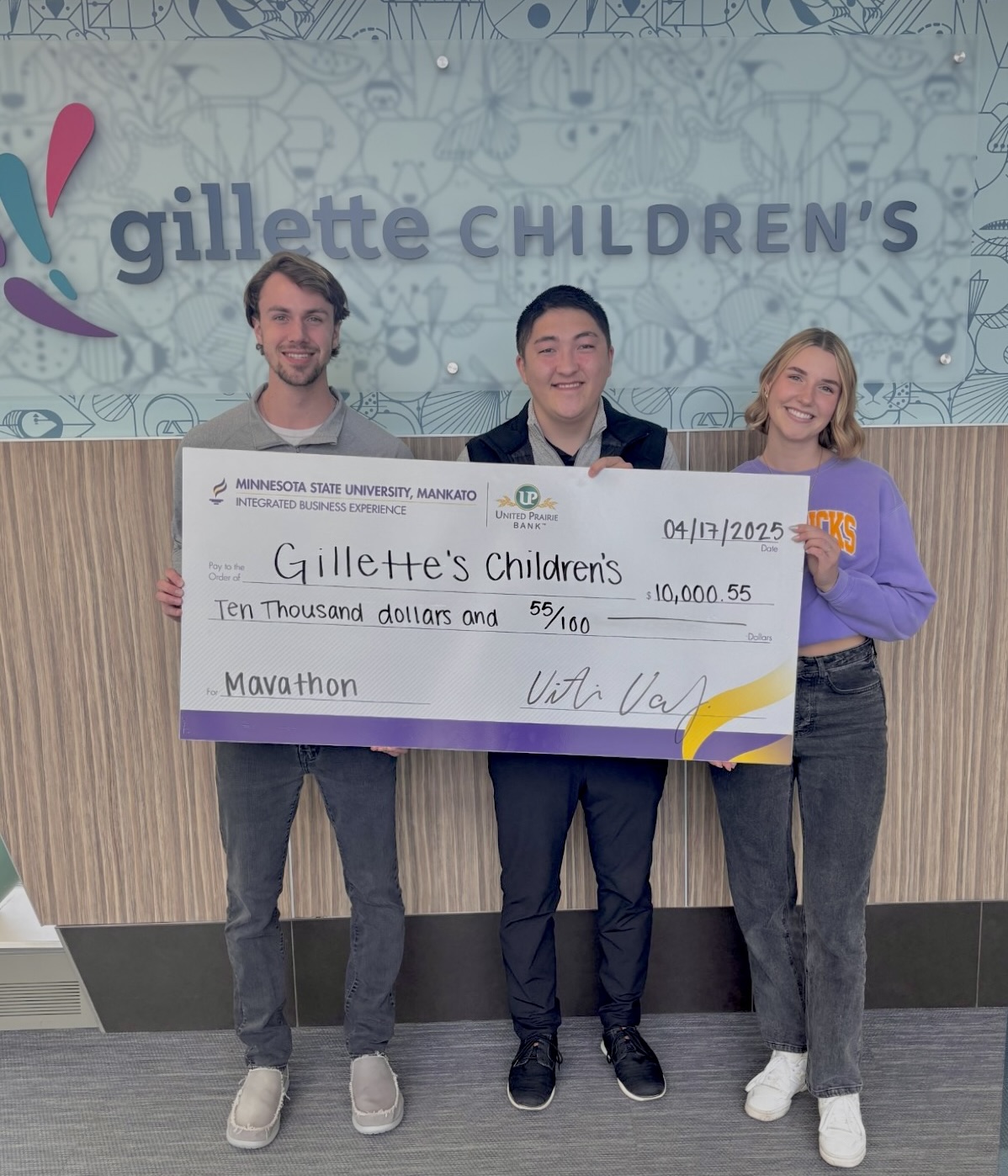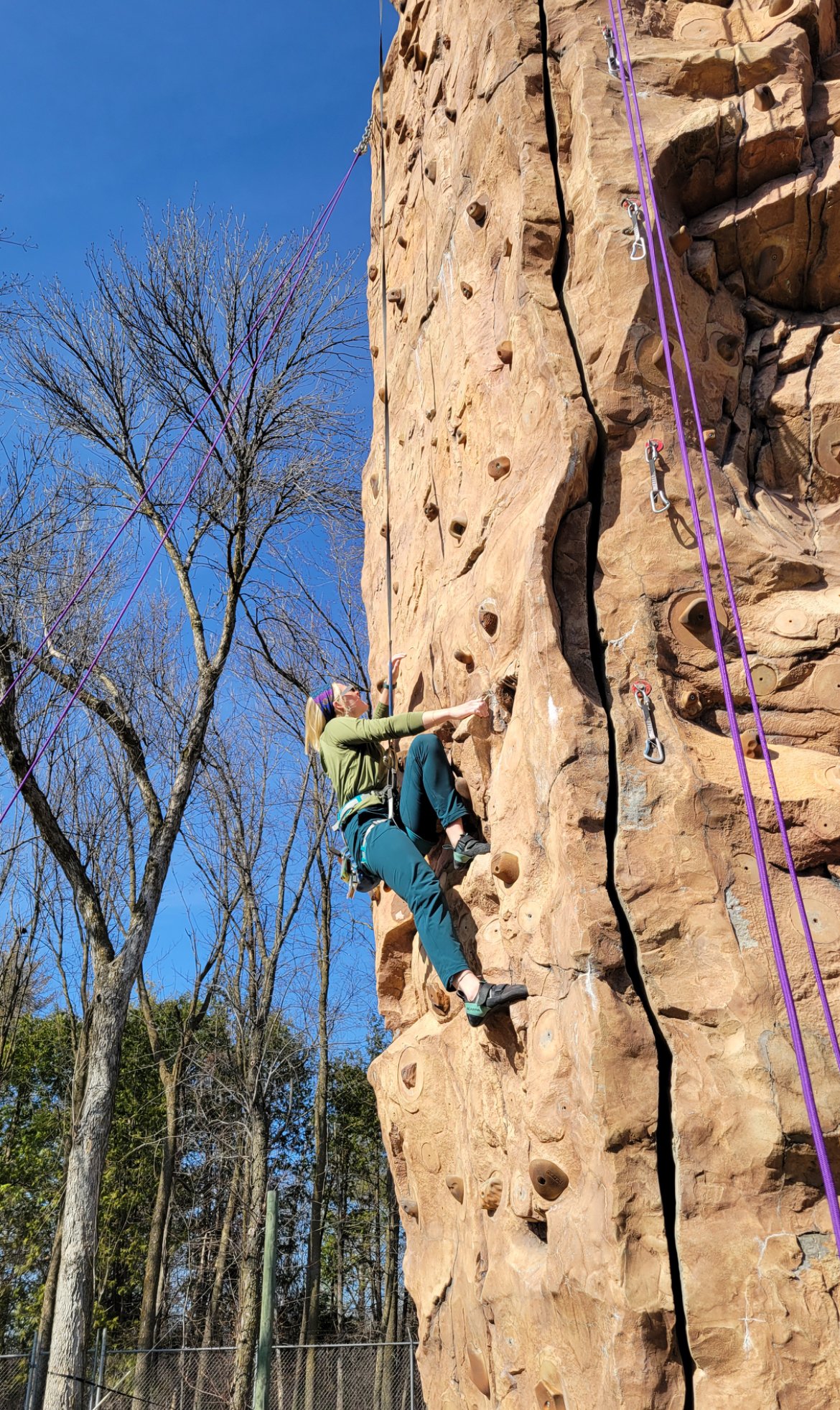Maverick Moments
These stories highlight students, faculty, staff, and/or events from Student Affairs Offices fostering big ideas and real-world thinking on campus and in the community.

A New Era in Campus Scheduling
With more than two decades of experience at Minnesota State University, Mankato in Student Activities and University Operations, Bill Tourville is bringing a unique perspective to his new role as Assistant Director of University Scheduling and Conference Services. In his time in higher education, Tourville has held every role from building manager to operations staff to student activities. He shared that he has “lived in all three areas of University Scheduling—intake, implementation and utilization.”
His new role carries three primary responsibilities: working with University Scheduling, helping coordinate camps and conferences and promoting the University’s spaces to external clients for usage.
Full Story + Show Less –Within University Scheduling, Tourville is working swiftly to roll out changes this fall on how reservations and events are scheduled in the scheduling software. The Minnesota State system will begin to integrate online meeting reservations so booking spaces and meeting rooms will be directly linked to the student, faculty and staff’s account. Tourville explains that this change will not only help streamline the process for individuals, but it will also help collect data to track how often rooms are getting used by reservations. The goal is for this system to make scheduling more automated and user-friendly. “It’s going to be a new way of doing things, and new things are sometimes difficult the first few times around, but once everyone gets the hang of it, it’s going to be extremely nice for all Mavericks,” Tourville said. He hopes a large portion of reservations that come in will be more automated once the new system is launched this fall. "With change comes new opportunity,” emphasizes Tourville, which will help achieve the overall goal of bringing more people to campus, both internally and externally.
Another key initiative is ensuring that University Scheduling serves as a true “one-stop shop” for anyone planning a conference, meeting or large-scale event. University Scheduling is there to help individuals plan their event, make the necessary reservations and details, and communicate with those needed to execute the event. “The task is tall sometimes for University Scheduling, because we are the University that is ‘Big ideas. Real-world thinking. Inspired action.”, on campus and in the community. We have a campus and a culture that dreams big and therefore, needs to plan big and execute big.”
He shared as an example the Career Development Center’s plans to develop one of Minnesota’s largest career fairs in Myers Field House in the fall of 2025. A large event like that takes a lot of planning and coordination between all levels of Minnesota State Mankato. University Scheduling and Conference Services has to make sure that parking needs, tables, electricity, garbage cans, food service and all other day-of-event services are coordinated and communicated while maintaining normal university operations.
Looking ahead, Tourville sees even greater possibilities for how Minnesota State Mankato’s spaces can be utilized, especially by external groups during times when campus activity is lower. “This University has some amazing spaces and an amazing campus,” he says, commending the grounds crew for their work in keeping the space welcoming and warm. He adds, “We want to open our doors to external groups to everything MSU has to offer. We can explore ways that departments, colleges and staff can engage with potential students or returning learners in their areas.” Expanding the possibilities in terms of greater engagement with both the on-campus and off-campus communities will maximize use of these beautiful spaces around campus.
One significant growth area Tourville highlights is returning adult learners—alumni and others who want to come back to campus, explore more in their area of study or try something entirely new. “They want to come back and stay a few nights, relive some memories, while doing something that enriches their learning,” Tourville shares. To meet that demand, he envisions partnering with academic and support departments to create ongoing learning opportunities for adults who have the time and resources to re-engage with the University. Online literature is finding that it is often retired individuals who are most interested in ongoing education. Tourville imagines utilizing spaces on campus, such as the rock wall or Maverick Bullpen, to focus on providing returning adult learners or prospective students with services that can give them with a glimpse into campus life, as well as fun things to do.
Tourville is clear that his first step is to make sure University Scheduling is ready to take on the possible influx of reservations and campus events. He shared that the model that guides his work and life is, “if you’re going to do something, do something right the first time.” He highlights that is something he personally embraces and feels as though the office and University embraces as well. Tourville emphasizes that readiness is built on careful planning and strong campus communication. “It might be a slow build to first ensure there’s the infrastructure in place to start expanding,” he explains. “We have to make sure key campus partners have good communication so we can take on more opportunities. It may take a little while,” Tourville predicts, “but it will be coming.”
He stated that he would rather “under promise and over deliver.” So, with Tourville just stepping into this role in June, he remarked “my hope is that by next summer we will have a lot more defined,” such as marketing materials and a dedicated website with how-to guides with the process for community members to reserve spaces.
Big ideas, real-world thinking and inspired action on campus and in the community.

Nikki Stock Named New Dean of Students
Nikki Stock has been named Dean of Students after serving as interim Dean of Students since January 2024.
Stock first came to Minnesota State University, Mankato in 1999 as a graduate student in College Student Affairs within the Counseling and Student Personnel department. She was a graduate assistant in First Year Experience, now known as Orientation and Family Programs, and became the full-time Coordinator of Orientation in the summer of 2001, while still in school. Upon graduating in 2002, Stock worked as an academic advisor at St. Catherine’s University from 2002-2004. She returned to Minnesota State Mankato in 2004 as the Assistant Director in Orientation and Family Programs, and later became the Director of Orientation and Family Programs in 2009. She remained in that role until becoming the interim Dean of Students in 2024.
Full Story + Show Less –One day before interviewing for the permanent role of Dean of Students, Stock successfully defended her dissertation, receiving her Doctor of Education (Ed.D) in Higher Education Administration from St. Cloud State University. While her role as Dean of Students involves student conduct, that is just one aspect of the position. “I like the problem-solving of it because if a student case reaches me, it is a little bit more complex and there are more people involved,” Stock shares. “I enjoy working with my colleagues across different divisions.”
As the Dean of Students, Stock helps to ensure the University is in compliance with new legislation, such as helping pregnant and parenting students and implementing anti-hazing prevention practices. She is part of many support systems for marginalized groups across campus. She likes that her role is filled with new challenges and that every day is different, with the ultimate goal being “supporting our students in every way we can.”
The list of conduct cases has decreased within the past 10 years, and Stock credits changes within the city of Mankato and the University that offer a different approach to those situations. She believes they have more “educational conversations” with students, asking the student to reflect about how their behaviors align with their values. In addition to student conduct and behavior, Stock highlighted that many students need resources. She remarked that she sees a lot of Campus Assessment, Response and Evaluation Team (CARE) reports, oftentimes related to mental health concerns. Stock’s role is to work with other members of the CARE team to connect students with resources and triage crises. She described it as “finding the people that they need to find.”
When considering future initiatives, Stock shared that she hopes to do a social media marketing campaign promoting what student responsibility looks like and “how to be a responsible Maverick.” Ultimately, Stock said she is “excited to be continuing here, continuing my Maverick journey.” She spoke very highly of the environment and people at Minnesota State Mankato and remarked that both have been key components keeping her at the University. Although she’s now settled more permanently in a new role, Stock appreciates the familiarity and comfort within the Maverick community.
Big ideas, real-world thinking and inspired action on campus and in the community.

Mavathon Raises $10,000 for Gillette Children’s Hospital Specialty Healthcare
The Dance Marathon, also known as Mavathon, is a student-led, year-round philanthropic movement that raises funds and awareness for sick and injured kids being treated at the Gillette Children’s Hospital. The mission of Mavathon is “raising money for kids in a meaningful and unexpected way,” shared Victoria Volberg, Mavathon co-president. “It is a way to raise money in a fun way.”
On March 22, the Mavathon included over 75 participants for four hours of dancing and fun. The day of the event was described as “high energy, lots of smiles and a celebration of the money raised.” When asked about her experience, Volberg exclaimed, “that was one of the best days ever.”
Participants, also known as dancers, commit to staying active throughout the event. They don’t necessarily have to dance the whole time, but they engage in various activities to symbolize their support for children who can’t always stand or move freely due to medical conditions. The event is open to the public and Volberg encouraged everyone to “invite who you know, bring who you know. All that matters is you care about the cause.”
Full Story + Show Less –A Champion Family who have a child being treated at Gillette and who will benefit directly from the funds raised came to the Mavathon event to share their story and demonstrate first-hand the impact these funds have on the children at Gillette. They also danced with the participants. “There were definitely some tears… it was cool to see the impact of the money that we raised,” said Volberg.
The organization reached its goal of raising $10,000, nearly $2,000 more than last year. All of the money raised goes directly to Gillette Children's Specialty Healthcare, a Children’s Miracle Network hospital that provides specialized care for children with complex medical conditions.
The event is run by a dedicated executive board and various committees, handling aspects like recruitment, sponsorship, logistics and marketing. Volberg, a member of the Sigma Sigma Sigma sorority, and Riley Regan, a member of Phi Delta Theta, served as co-presidents for an annual term to organize the fundraiser. The co-presidents worked closely with graduate advisor Kurt Ohlhues and coordinated with the Children’s Miracle Network to ensure a smooth experience for all involved.
Many universities host a Miracle Network Dance Marathon, some at a very large scale including a 24-hour dance. “My hope is that one day down the line it can be as huge as that,” Volberg shared.
Volberg visited the Gillette Children’s Hospital three times in the past year. She highlighted the ability to talk to families and see innovation rooms, and how impactful that was for her. Beyond being a fundraiser, Mavathon fosters a sense of community, bringing together students, faculty, and the local community in a shared mission to make a difference in children's lives. Volberg said her involvement was rewarding, and remarked “it’s never too late to get involved… it doesn’t matter if you’re a student, faculty member or a community member… you can make a difference in a huge way.”
The organization is already accepting donations for the 2026 Mavathon.
Big ideas, real-world thinking and inspired action on campus and in the community.

More Than a Climb: How Maverick Adventures Became Riley Jones’ Second Family
As Riley Jones prepares to graduate from Minnesota State University, Mankato in May, she finds herself reflecting on the impact Maverick Adventures has made on her college experience and future career trajectory. “[Getting involved with] Maverick Adventures has by far been the best decision,” she says.
Jones first went to the rock wall alone in March of her senior year of high school while enrolled as a PSEO (Postsecondary Enrollment Option) student. She did not know much about rock climbing when she first started, but pushed herself to try something new. Then, in the summer before starting her first year on campus, Sam Steiger, program coordinator of Maverick Adventures, reached out to her asking if she would want to work at the rock wall. Jones had not planned to take a job during college, but she decided to accept the offer. Little did she know how influential the decision to say ‘yes’ would be.
Jones entered college as an Urban Studies major, but she switched to Recreation and Parks Leadership Studies (RPLS) in her second semester after seeing how transferrable the skills from the rock wall and her job with Maverick Adventures proved.
Full Story + Show Less –
She spoke very highly about the leadership within Maverick Adventures, crediting both Steiger and Assistant Program Coordinator Madison Vandersee for how much she has learned. “Sam and Madison are fantastic supervisors and bosses,” Jones says. “I would work for them forever if I could.” She felt that they created an environment that encouraged staff to approach situations from a different lens and that staff were given space to make mistakes. Not only did Jones develop a greater interest in rock climbing and grow as a leader, she also expanded her role within Maverick Adventures to other adventure-based activities as well. Her work in the new Maverick Adventures Outdoor Equipment Rental Center and leading various outdoor trips taught her new technical skills, such as how to fix parts of a bike and go ice fishing. Jones highlighted how much she has enjoyed these aspects of experiential learning. Maverick Adventures is looking to expand their rental center through more equipment and donations.
Because Maverick Adventures is primarily run by students, there is a revolving door of staff. Jones felt that within the past year she grew exponentially as a leader and has had an opportunity to make a difference and set the example for newer staff. “I’ve learned so much about leadership,” she says. “Being promoted [to manager] gave me confidence. I felt respected, and that helped me grow.”
She recalled her first time showing up at the rock wall, alone, and described it as scary, but she kept coming back because she liked rock climbing. Based on her experience, she has stressed the importance of saying hi to the new people and making them feel welcome so they want to come back. Jones is training new staff to keep the environment welcoming because “I don’t want anyone to feel that way.” In the three years that she has been working there, the environment has improved, and she has recognized that “the environment is crucial for a community so small” and described the rock wall as “more than a community, it’s like a family.”
Jones feels that her involvement through Maverick Adventures has opened the doors to many different career opportunities. Post graduation, she is considering her next steps and reflecting on what makes her happy. “I think what really makes me happy is working in recreation,” she says. “Getting to see people have fun doing something that you organized and created… you give them the space.”
Without hesitation, Jones said that she will miss open climb nights most. She highlighted how fun it is to see the same people every night and the opportunity to see both herself and others improve. She is excited to see what is next for herself recreationally and professionally, giving credit to Maverick Adventures for opening those doors. Jones advises those considering rock climbing or something new for the first time to “believe in yourself, trust the process and try new things.”
“Don’t be afraid to go alone,” she added. “It could turn into your career.”
Big ideas, real-world thinking and inspired action on campus and in the community.
Student Affairs Retention Scholarship
Since 2019, the Student Affairs Retention Scholarship has been making a difference in students’ lives by encouraging academic success and reducing financial burdens.
The scholarship was created with the intention of helping students focus more on their academics. “We know at the University many students drop out before they have completed their degree for financial reasons,” explains Carolyn Nelson, the director of scholarships. “If we can help relieve some of that burden of working and student loan indebtedness, then we can help students be more successful the following academic year.”
Student Affairs emphasizes the importance of balancing work and academics. A goal with this scholarship is to limit the employment of students to less than 20 hours a week to allow them more time to focus on their studies. This scholarship demonstrates the commitment to retention and helping students complete their degrees at Minnesota State University, Mankato.
Full Story + Show Less –Students apply for the scholarship during the University’s annual scholarship cycle, which takes place every February. Each year, the university awards nearly $3 million in scholarships for the following academic year. The Student Affairs Retention Scholarship specifically prioritizes sophomores, juniors and seniors who are active participants in Recognized Student Organizations (RSOs) or hold on-campus student positions within Student Affairs. Additionally, academic excellence is a key consideration.
The selection process is comprised of a committee of professionals within Student Affairs departments to ensure fairness and that the recipients demonstrate a strong need. This year, the review committee includes 10 members who have graciously offered to dedicate their time to carefully assess each application. Applicants are often students who work closely with professionals in the Division of Student Affairs and Enrollment Management, so the reviewers have the opportunity to see first-hand what current challenges the students are facing, from financial difficulties to balancing academics and social engagements.
One of the most striking trends Nelson has observed over the years is the volume of applicants for a single scholarship. This year, the Student Affairs Retention Scholarship received 136 applicants. “It hasn’t been uncommon for that to range from 100 to 200 applications,” Nelson says. “There is a definite demonstration of need for additional scholarship opportunities at this University, and specifically the Student Affairs Retention Scholarship.”
Since its inception, this scholarship has been able to help one student per academic year based on funding and donations provided. Nelson remarked that additional donations could allow the scholarship to support more students in need.
With a goal of this scholarship being to allow students to work less and focus more on academics and the college experience, it focuses on recognizing students who are engaged in campus life. A past recipient shared their involvement in Fraternity and Sorority Life and participation in other RSO’s. This recipient expressed how being a member of Fraternity and Sorority Life has helped them build lifelong friendships and engage in community service. Additionally, this recipient is involved in the debate team, which they credit has helped them hone their public speaking skills and develop an appreciation for diverse perspectives.
Student Affairs professionals contribute to the scholarship in addition to actively participating in the selection process. “The Student Affairs Retention Scholarship demonstrates the commitment and care of Student Affairs professionals on our campus,” Nelson says. “One thing we see often in student reflections is the impact that student organizations, community engagement and Student Affairs professionals have had on students’ experiences at Minnesota State Mankato.”
Consider donating to the Student Affairs Retention Scholarship to help engaged students complete their degrees at Minnesota State University, Mankato.
Big ideas, real-world thinking and inspired action on campus and in the community.

